Report on the Event of “Meet the Ambassador: Ambassador of Turkey"
16 November 2022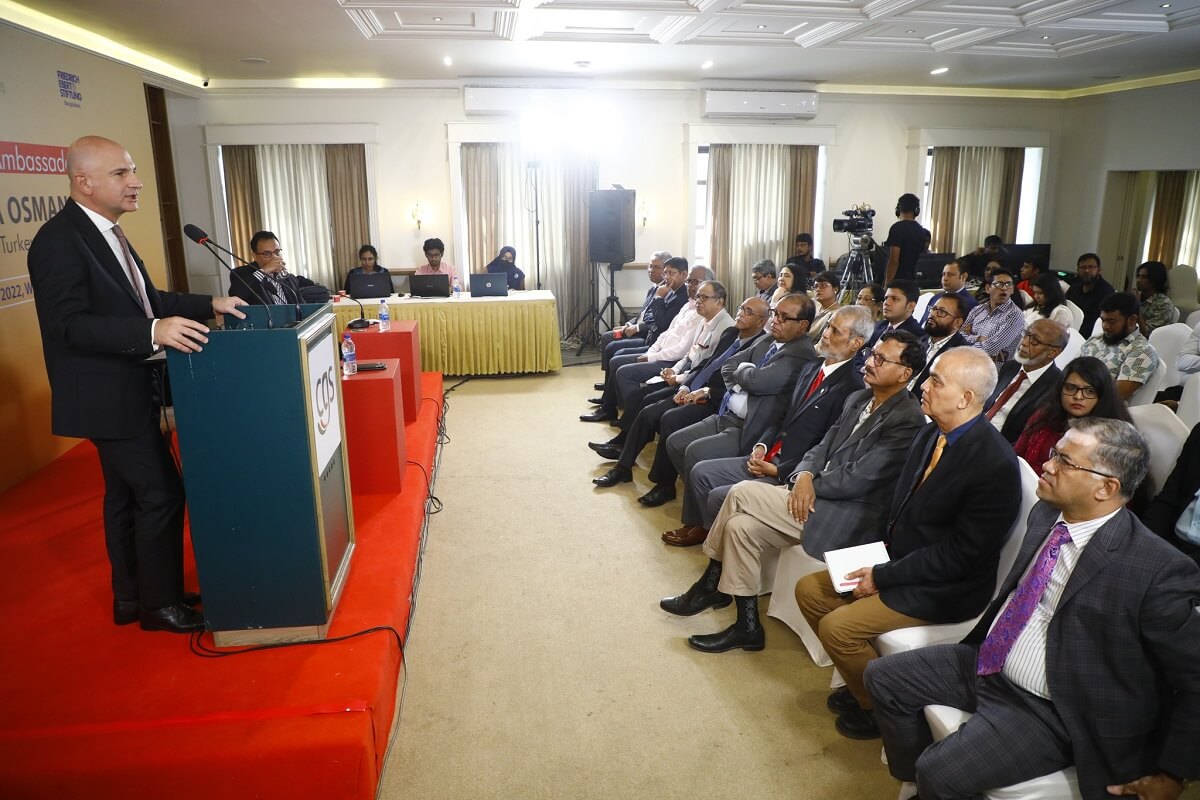
On Wednesday, 16th November, a program was hosted by the Centre for Governance Studies (CGS) in collaboration with Friedrich-Ebert-Stiftung (FES) Bangladesh. The event took place in a hotel in Dhaka and was the fifth in a series of "Meet the Ambassador" programs where ambassadors from various nations and international organizations are invited to talk to politicians from both the ruling and opposition parties and members of Bangladesh’s businesses, civil society, academics, entrepreneurs, and. H.E. Mustafa Osman Turan was the key speaker at the event, where he gave a keynote speech and then answered questions regarding relations between Turkey and Bangladesh.
An introductory remark was given by the Chairman of CGS and Chairman of the National River Protection Commission, Manjur A. Chowdhury. This was followed by an address given by the Program Coordinator of FES Bangladesh, Mr. Shadhan Kumar Das. The discussion was then opened up for questions and answers. Zillur Rahman, Executive Director of CGS, served in the role of moderator for the discussion.
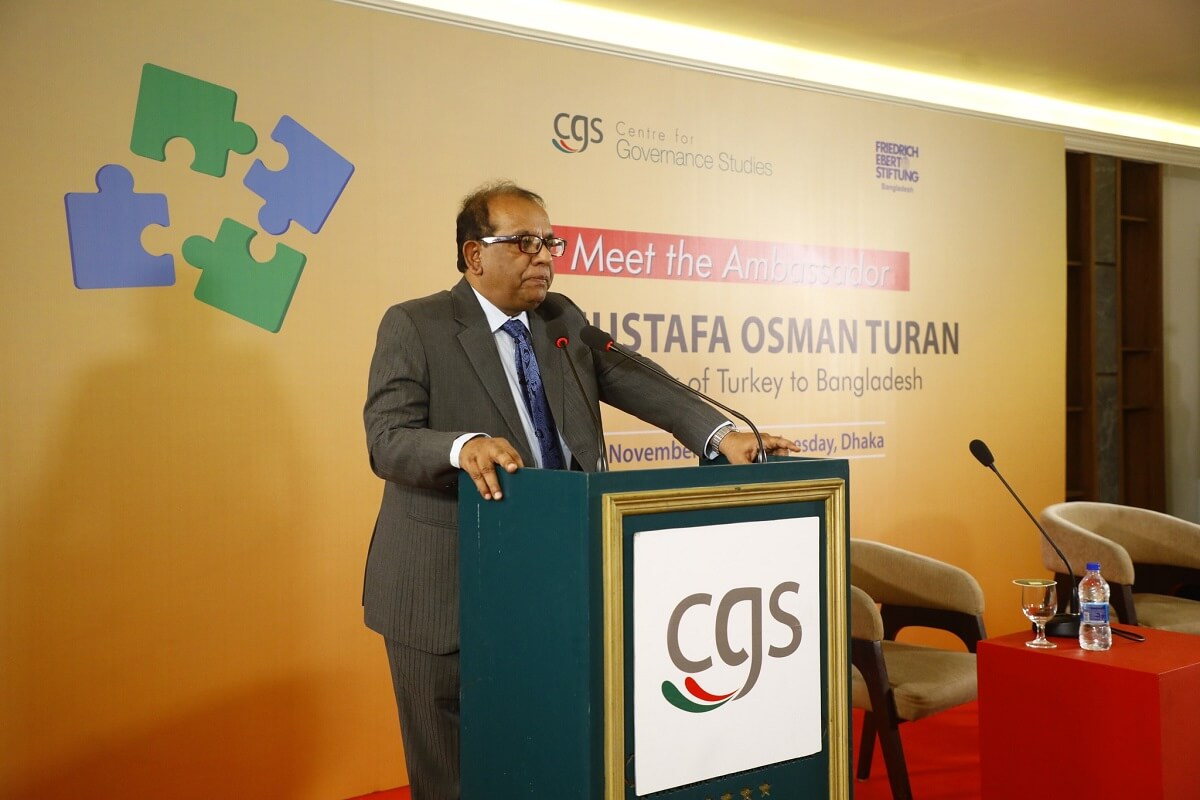
Manjur A. Chowdhury welcomed everyone on behalf of CGS. During his speech, he discussed in detail the historical, political, cultural and linguistic relations that bind Turkey and Bangladesh together. He also spoke about how the Muslim people of the region have supported turkey's independence movement in the past and how he hopes that this trend will continue in the future.
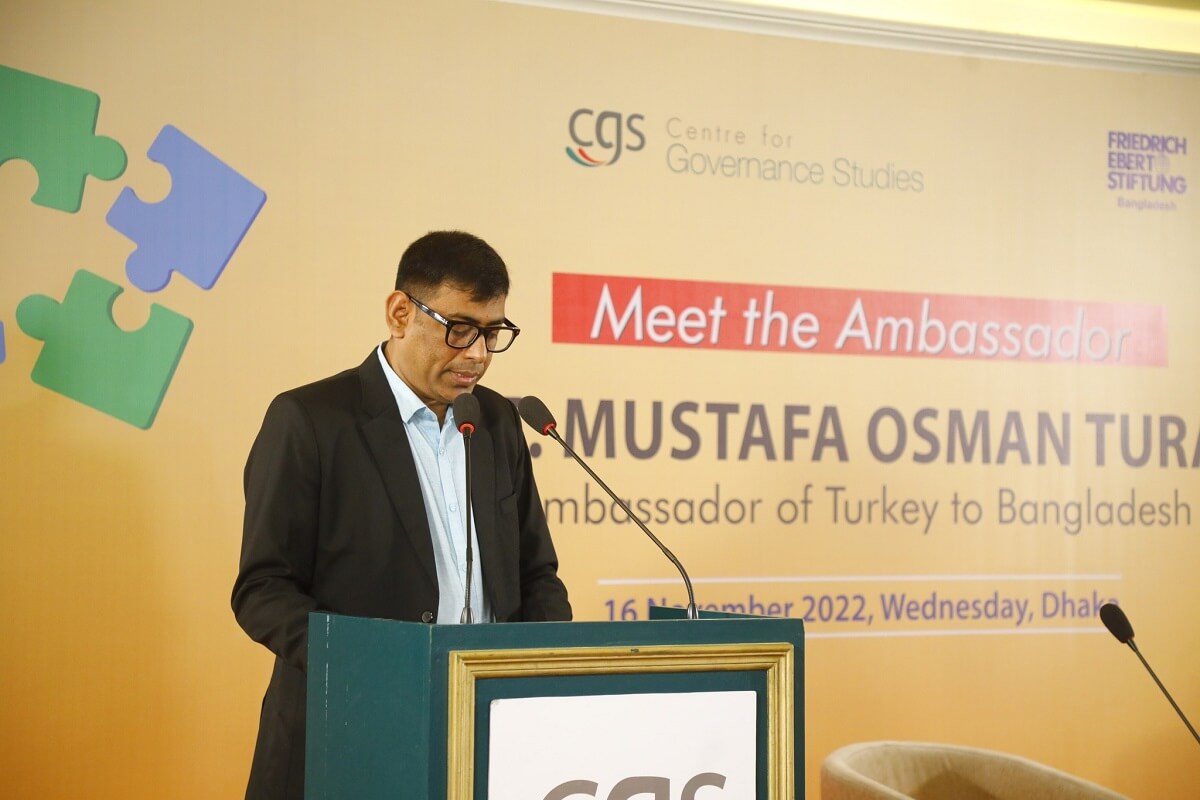
Shadhan Kumar Das gave his welcome speech on behalf of the Resident Representative of
FES Bangladesh. In his speech, he talked about the nature of the work of FES in Bangladesh. He said Turkey recognized Bangladesh in February 1974. A few days after the independence of Bangladesh, the Turkish Embassy in Dhaka was opened in 1976. The Bangladesh Embassy in Ankara was inaugurated in 1981. He then laid emphasis on economic and trade relations between the two countries in 2020. Turkey's imports from Bangladesh were $547 million. For the last 25 years, Bangladesh has mainly exported jute yarn, non-knit men's suits and knit T-shirts to Turkey. Bangladesh's exports to Turkey increased from $21.6 million in 1995 to $547 million in 2020, growing at an annual rate of 13.8%. Turkey's initial exports to Bangladesh in the same year, valued at $341 million, were heavy pure woven cotton, textile processing equipment and heavy mixed woven cotton for the past 25 years.
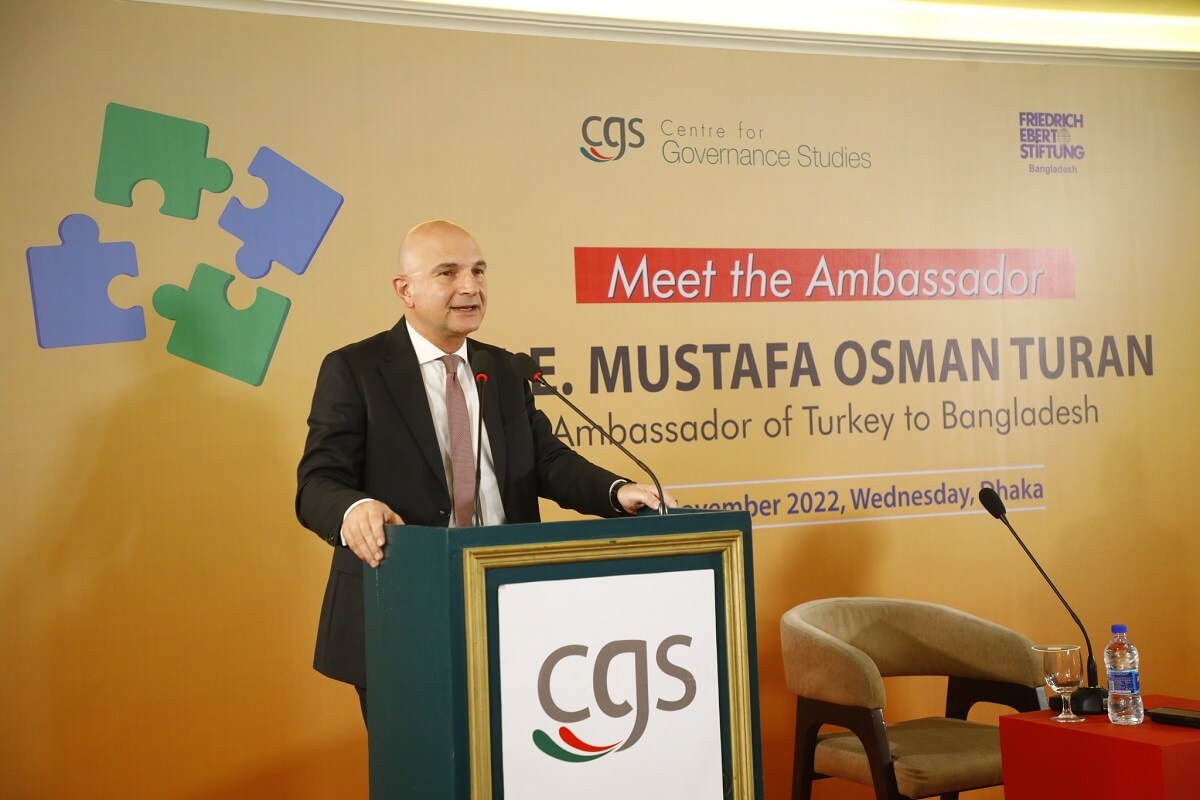
H.E. Mustafa Osman Turan, in the midst of his keynote speech, provided a concise summary of the links that exist between Bangladesh and Turkey. He emphasized the two-way, or "bilateral," interactions that exist between the two nations by referring to the time frames of the past, present, and future. He described the ways in which the people of the two areas have worked together throughout history, beginning with the Mughal Empire and continuing up to the present day.
He asserted that during the difficult time, Turkey was going throughout the First World War, he wanted to convey his thanks to the people of the area for their spiritual and financial assistance. He also mentioned Bangabandhu, Kazi Nazrul Islam, and Kamal Ataturk, and he said that the people of both nations were inspired by the secular spirit that these men had.
In reference to the present state of affairs, he said that at this time, the economic ties that bind the two nations together are becoming stronger. He estimated that it would be $815 million in the year 2020, but it has now grown to be close to $1.5 billion and their target is to increase it up to two billion dollars in one or two years. He placed a strong emphasis on the Bangladesh-Turkey Business Forum (BTBF), which featured the participation of 11 powerful Bangladeshi companies and six Turkish companies operating in Bangladesh. He hoped that they would further promote our trade and investments, which would assist in enhancing commercial ties. “Despite the fact that we had a few difficulties in the past, we were able to fix things via our friendship and honesty," he said. It was his expectation that the President of Turkey would pay a visit to Bangladesh the following year.
He stressed that Bangladesh is Turkey's main partner in the new Asia agenda, which has been announced. In order to encourage cultural exchanges between the two countries, he favored the construction of a Bengali cultural center in the Turkish capital city of Ankara and a Turkish cultural center in Dhaka, the capital city of Bangladesh.
He also mentioned defense cooperation. Cooperation between our armed forces is exemplary. We have signed a security cooperation agreement between our police forces, so we hope that cooperation will be developed in the near future in the fight against terrorism and violent extremism.
He concluded his speech by mentioning that he was "feeling almost at home in Bangladesh." Mr. Turan felt that the prospects of bilateral relations were favorable.
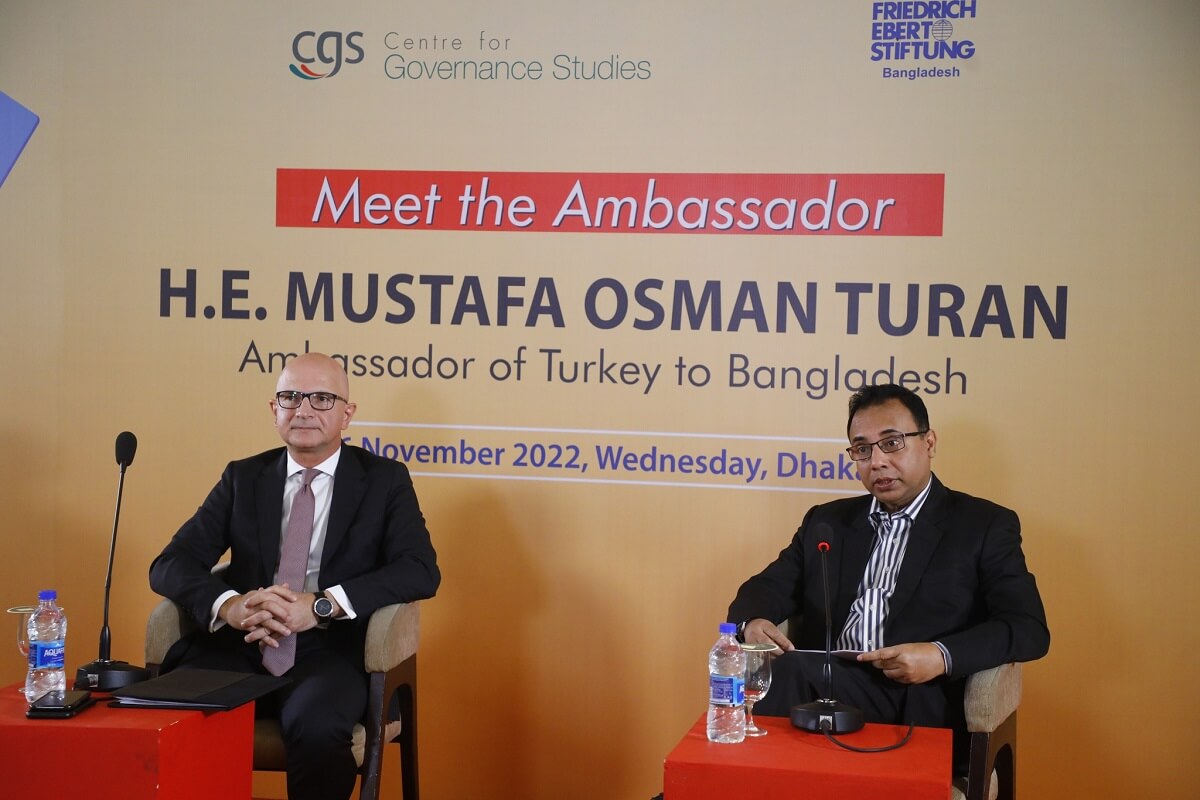
During the discussion with the moderator of the event and Executive Director of CGS, Zillur Rahman, the ambassador mentioned that he entered Bangladesh as an ambassador immediately before the COVID-19 pandemic, which was a very difficult moment in the history of Bangladesh. When asked to think about the time spent in this position, he said, "There was a feeling of being here." He also mentioned that their focus was more on how we could support each other in times of need. They have also provided some medical assistance to Bangladesh and some assistance to underprivileged groups affected by the COVID situation. But he appreciated that Bangladesh handled those times quite well.
He said he is impressed by the culture of Bangladesh, especially the song of Rabindranath Tagore and Kazi Nazrul Islam.
According to him, Bangladesh is benefiting from Asian investment and trade. It was a dramatic example of how a nation could move forward at a rapid pace with political stability and smart economic policies. The Asia Anew Policy supports the importance of countries like Bangladesh, which has a balanced foreign policy. Bangladesh's foreign policy is well-coordinated, so we don't think we are involved in any project in the region. For example, a free and open Indo-Pacific has a military dimension. This is a superpower struggle, so a military alliance is extremely useful in the region. There is a possibility of engagement and coordination with all parties in Asia and we believe that Bangladesh is our natural partner due to our comparable foreign policy.
On the counter-terrorism matter, the envoy said that Bangladesh and Turkey signed an agreement in January, which involves cooperation in training, experience exchange, and fighting violent extremism. He also praised that Bangladesh has acquired a lot of expertise, which was shared during the event, and Turkey would start sending delegations of experts to teach our police personnel. He also said that a terrorist assaulted Istanbul a few days ago; which they had been battling for 30 years.
While talking about climate change related issues, the Ambassador said that, Climate change is an important issue, although we know that Bangladesh is now chairing the most vulnerable countries group. In this process, he added that we have also signed and ratified the Paris Agreement, and our country is very eager to be a part of the solution. He emphasized that climate change-related issues and problems obviously require global cooperation, and we would like to see the benefits from Bangladesh's experiences. In the fields of adaptation and mitigation, Bangladesh is really good. He also said that Bangladesh was rooting for the compensation of loss and damage issues in the context of climate change and he hoped that there’s a lot to learn from each other in this, and both Bangladesh and Turkey might benefit.
In his response to the question about the purchase of armed forces, he added that Bangladesh has made some proposals for technology transfer in the field of the construction of petroleum vessels, and if that proposal is accepted, most of the vessels will be manufactured in Bangladesh. He also asserted that Turkey does not attach any political conditions to its defense cooperation with Bangladesh. Bangladesh has purchased multi-launcher rocket systems, which are now in the inventory of the Bangladeshi Armed Forces.
In reference to the Rohingya repatriation, he said that they would continue to assist Bangladesh in the same manner as in the past.
In explaining the possible plan of expanding trade with Bangladesh the Ambassador of Turkey mentioned that the relationship is on the increase and within the first 9 months of this year the trade is of 950 million dollars, targeting to get nearly 1.4 billion dollars this year. Though economic hardship is all around the world and costs are at an all-time high, he hopes to cross the 2 billion thresholds in the next year or the year after. He emphasized on signing Preferential Trade Agreements rather than FTA between Bangladesh and Turkey to remove obstacles to trade and diversify items. He further expressed the hope of more dedicated and powerful collaboration of these two countries through BTBF in the next economic commission meeting which will be taking place in the next year in Dhaka. He believes that the promotion of Bangladesh from LDC will make Bangladesh more competitive and push it to develop its capacity for diversity in international trade.
He claimed that Turkey has always been concern and well-wisher of Bangladesh which was clearly shown after the Rohingya Crisis with the visit of first lady of Turkey and she was the first person to visit. In term of mediation in Rohingya Crisis and bringing a resolution, he pointed up the fact that mediator requires all parties to agree to their role. He assured that Turkey is efficient in mediator efforts and promised to work on the issue but the role of Turkey should be acknowledged first. He showed affirmation to the fact that proper steps must be taken to ensure that the current authority of Myanmar agrees to take Rohingyas back. Apart from that he gave words to the issue that Bangladesh government would be provided humanitarian assistance as long as Rohingya Crisis continues in the country.
Regarding the upcoming election, he stated that the responsibility of free and fair election doesn’t rely only on the role of the Government but also on the willingness of opposition parties because it is essential for the benefit of the country. He proposed that political parties need to sit together to discuss their necessity and priority for a clear electoral process which would be beneficiary for all the parties involved.
When asked about the role of OIC, his response was including the challenges and agreed that OIC may not be the most successful organization for Muslim countries because it also includes differences like the Yemen crisis.
Bangladesh is seen as a trust worthy manufacturing hub for Turkey. He also mentioned Bangladesh as an important economic player in this region as it is a prominent partner to direct and channel investment, its provided opportunity for the special economic zone, tax incentives, affordable and hardworking workforce, and access to different markets. But these strategic plans are yet to be agreed upon in the next commission meeting. He indicated BIDA as a very helpful agency to mitigate the differences and expect to see more active Turkish Businesses in Bangladesh like PPP projects for building infrastructure. One unexplored area of Turkey Bangladesh cooperation is this infrastructure building and Turkish companies are yet come to show their quality works and promises including local workforce that leads to contribute to the development of Bangladesh.
Focusing on the defense cooperation, he stated that military assistance from Turkey should not be confined only buying and selling rather joint collaboration must take as a strategic cooperation. Turkey has already shown interest in transfer technology and joint venture and signed agreement with BoF and high tech Turkish company for the artillery shell. The Coast Guard Bangladesh and Navy Bangladesh intended to construct some vessels under Turkish company which will be further produced in Khulna Bangladesh. Ship exporting and more collaboration in education system was discussed by His Excellency.
In the ending Remarks of this session, the Ambassador dreamed of that in the next 10 years the bilateral relation will grow stronger because of the historical, cultural, and religious bond geographical distance as “heart beats closure” of this two countries. The relationship should build upon mutual interest in the future. He believes Bangladesh can build proactive initiatives for regional cooperation and it is essential for the region as it holds two nuclear power. So, peace and security must be given priority, not any bilateral issue.
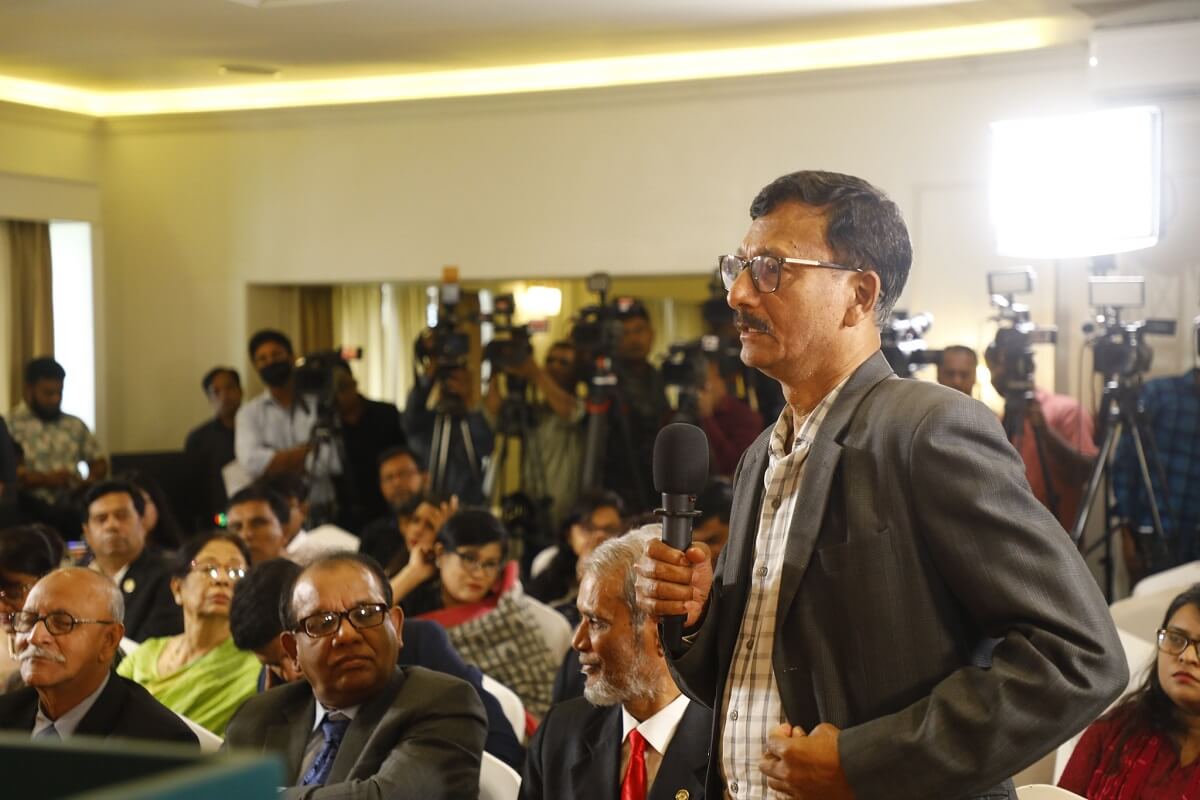
The final third of the program was dedicated to the audience’s question and answer session. Former Ambassador M Shafiullah, Former Foreign Secretary of Bangladesh Md Touhid Hossain, International Relations Assist. Secretary of BNP Fahima Nasrin Munni, Chairman of Kallyan party Maj. Gen. Syed M Ibrahim (Retd.), President of FEMA Munira Khan, Former Chairman of Janata Bank Dr. Jamal Uddin were among the others who participated in the question and answer session.
